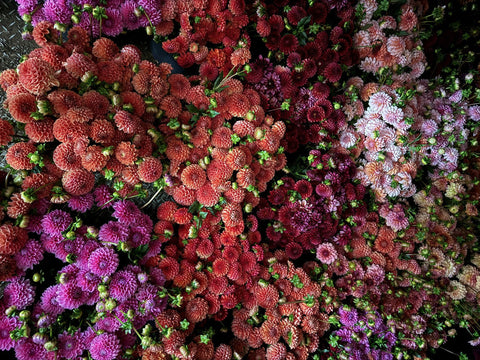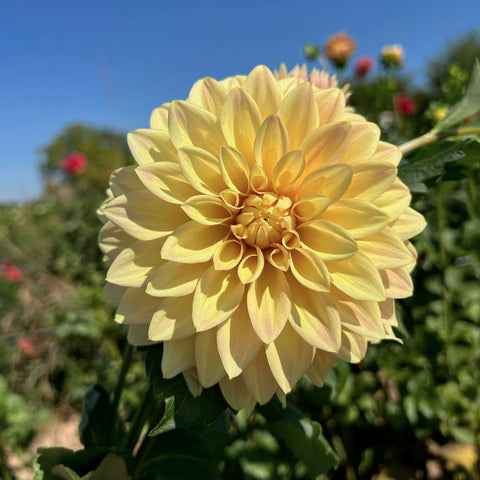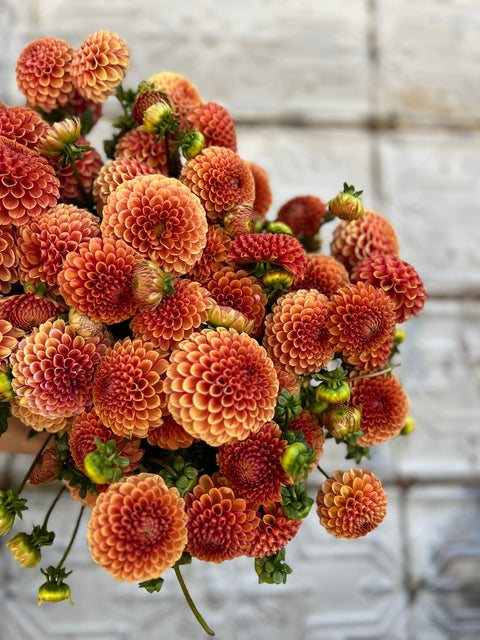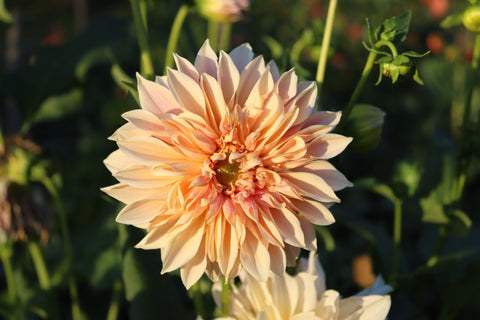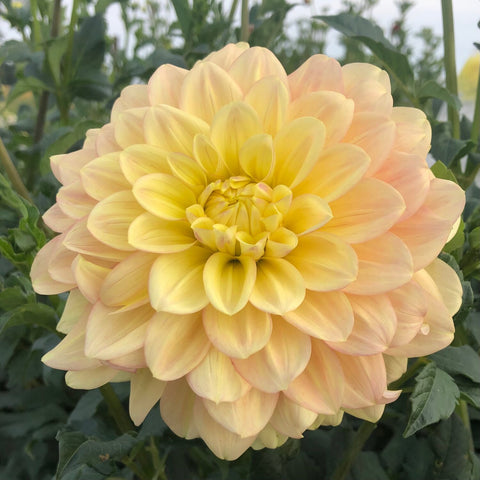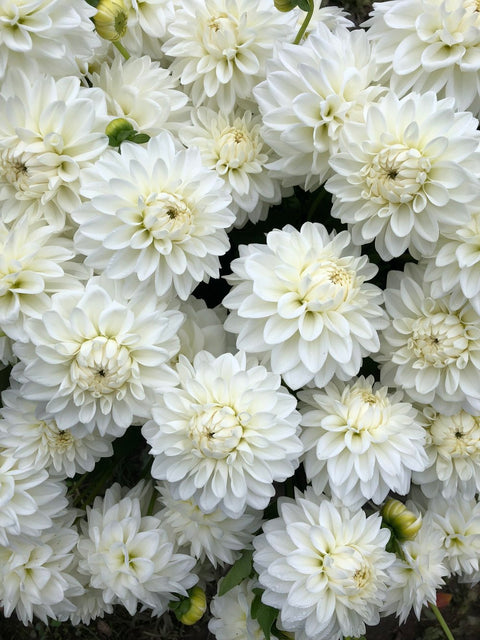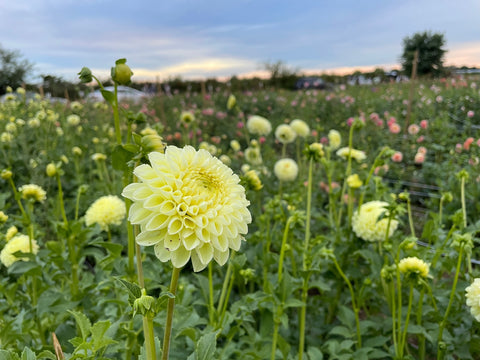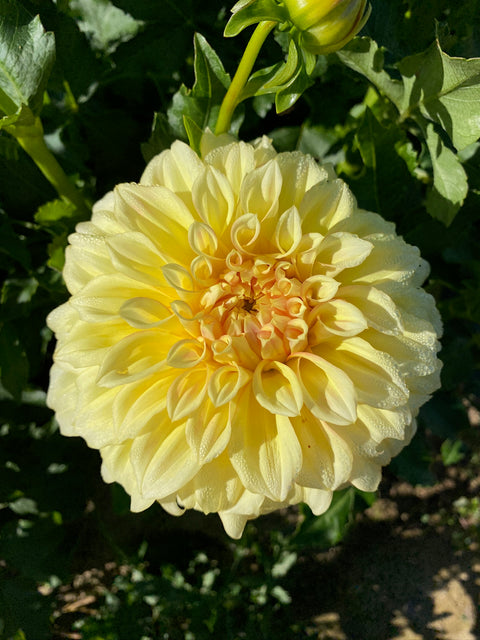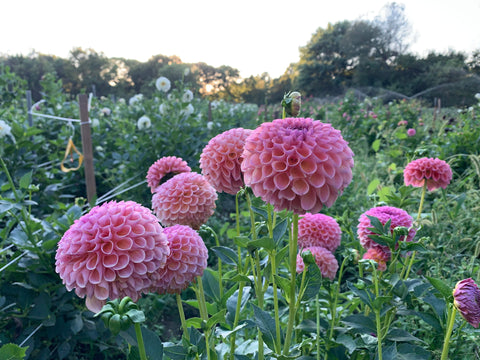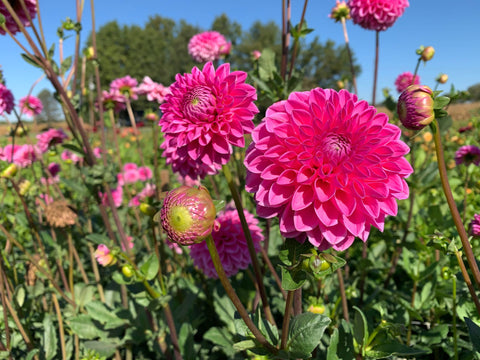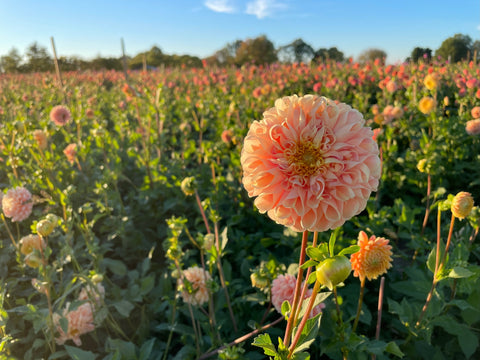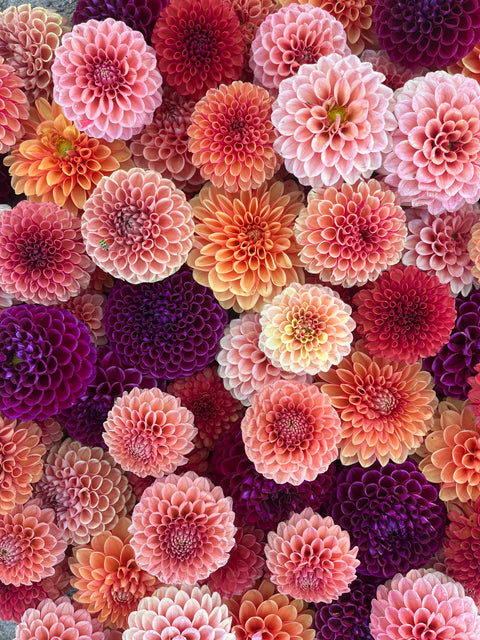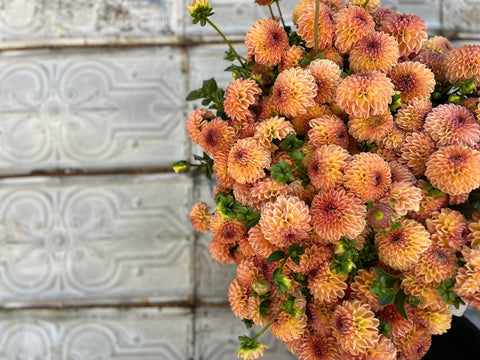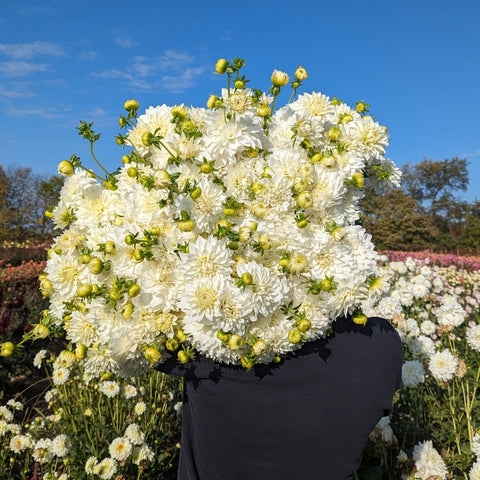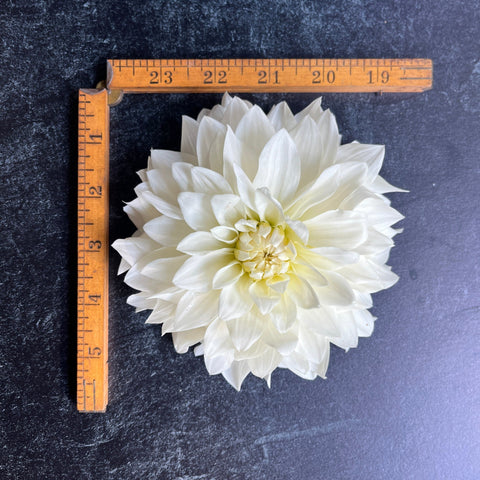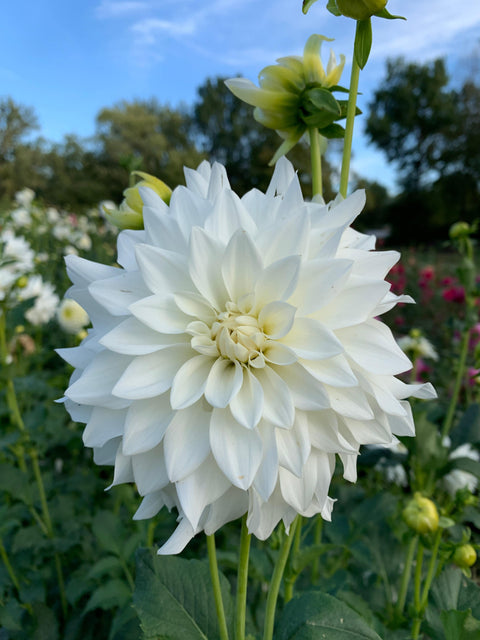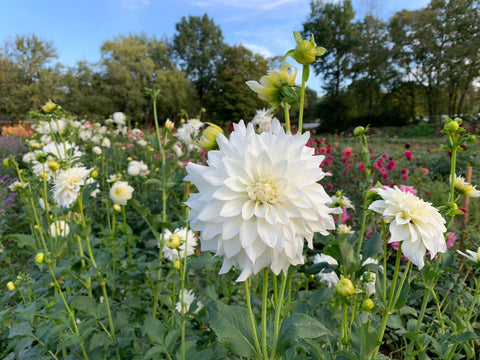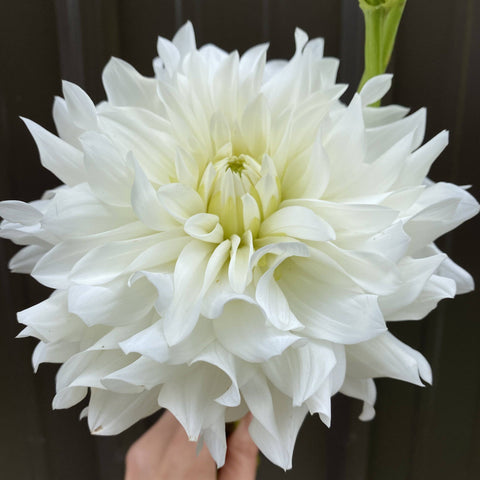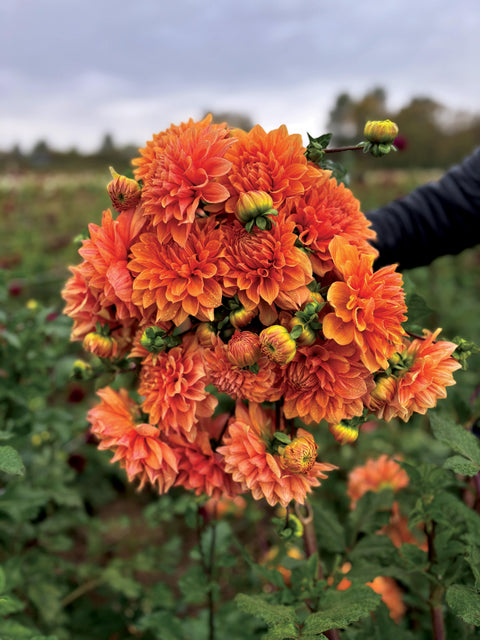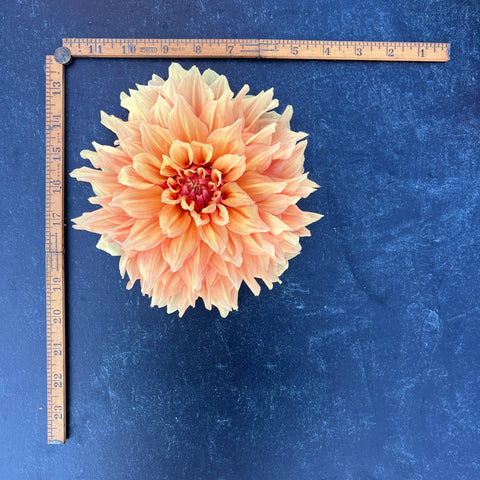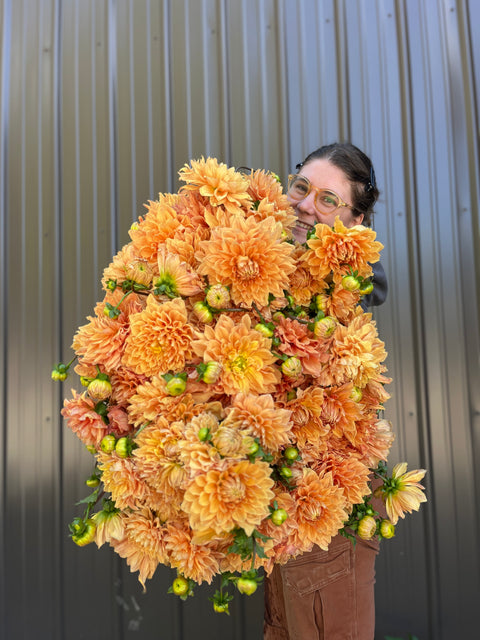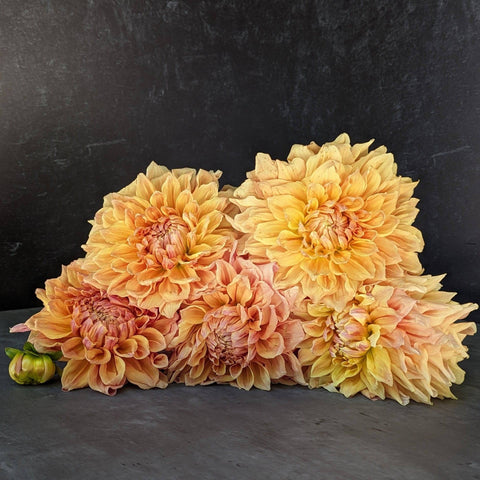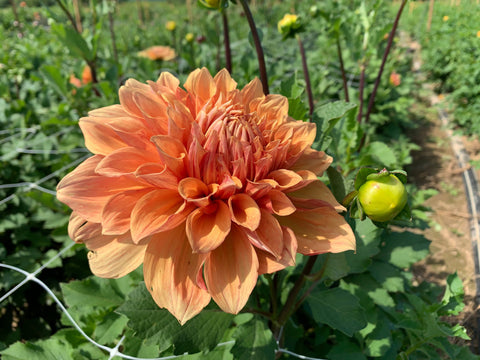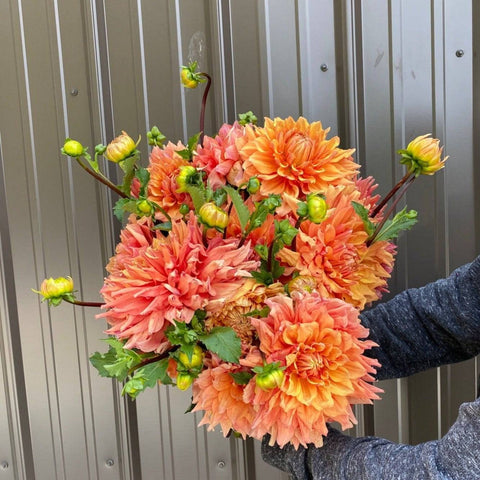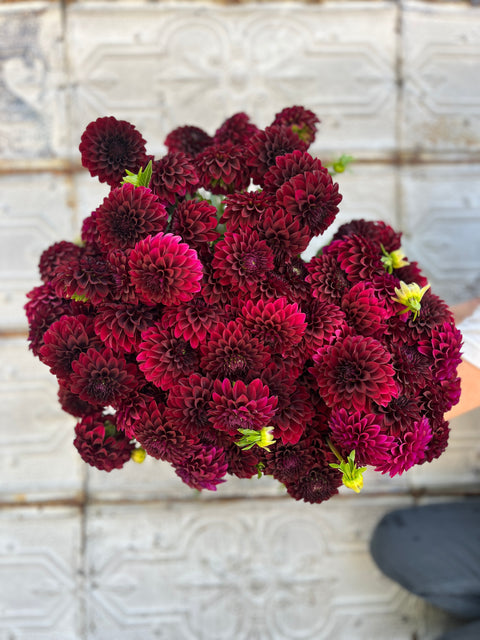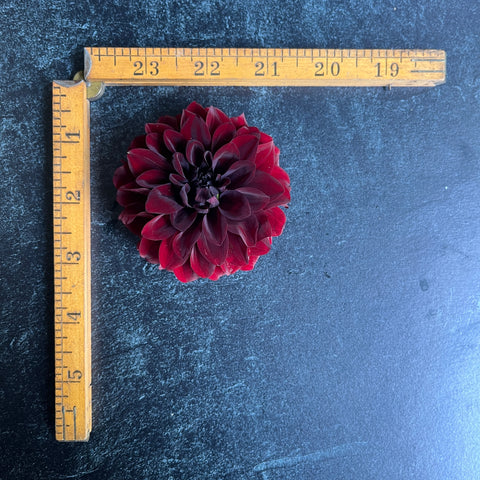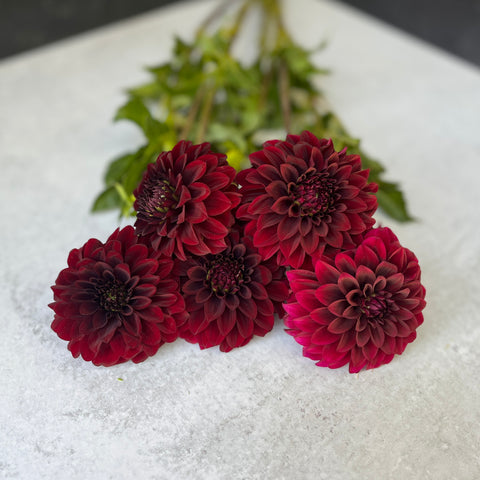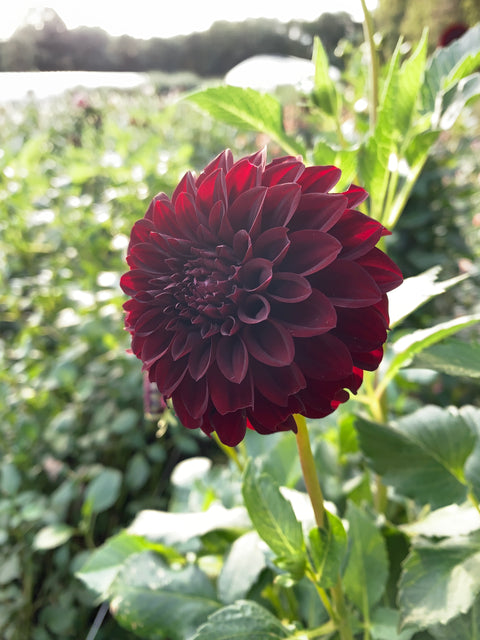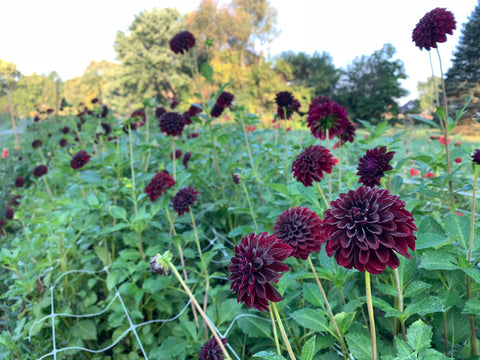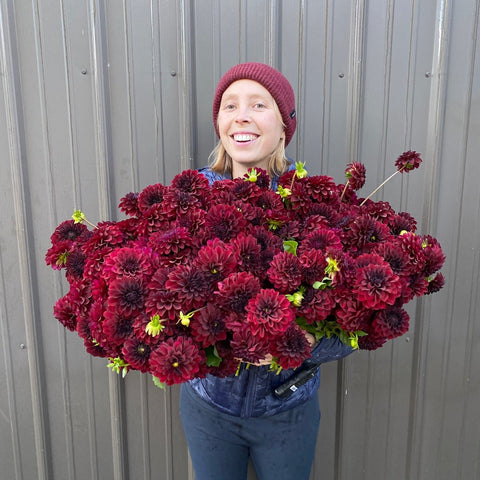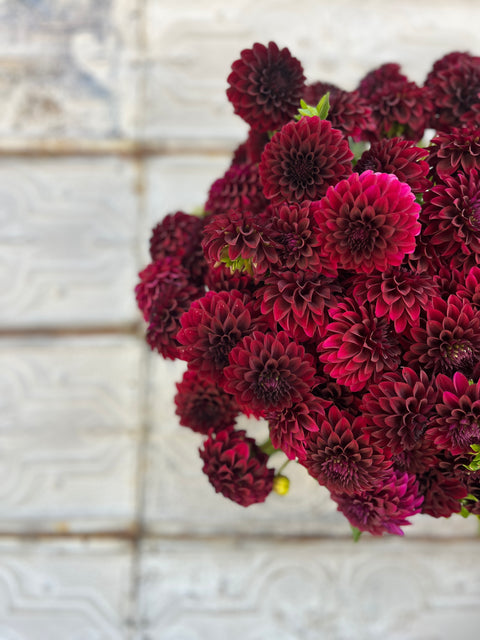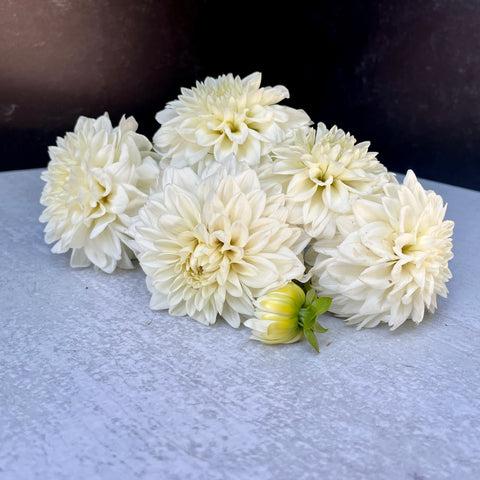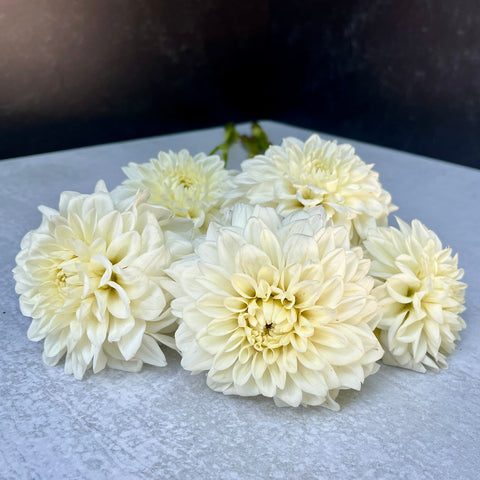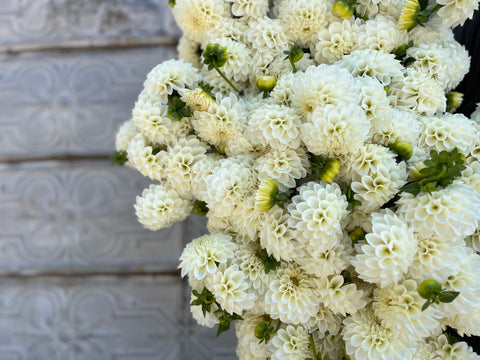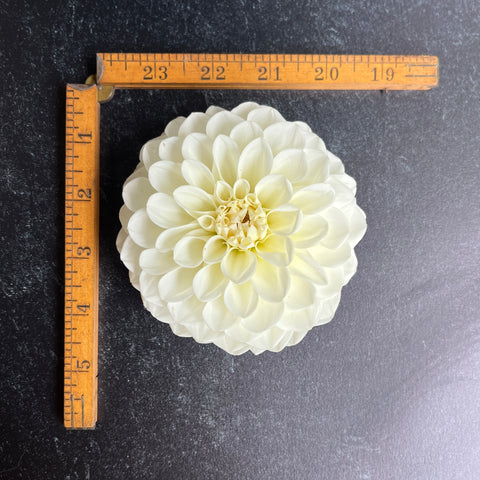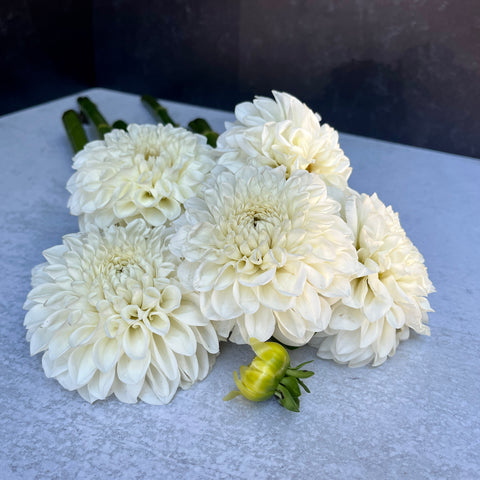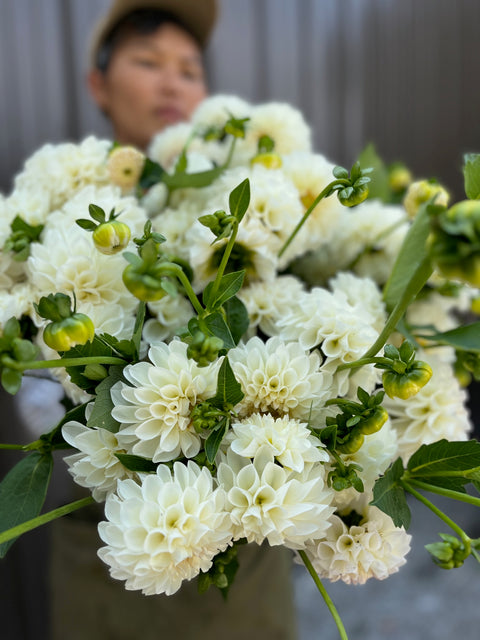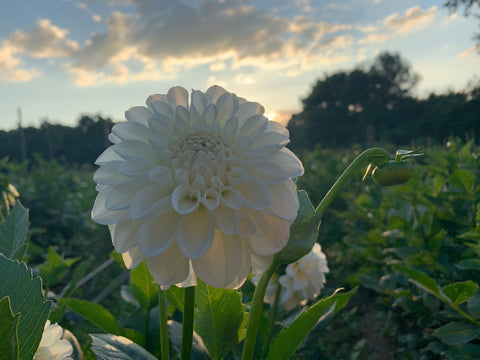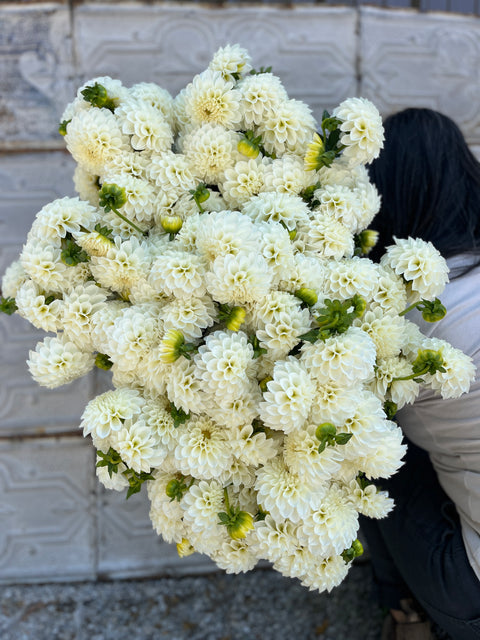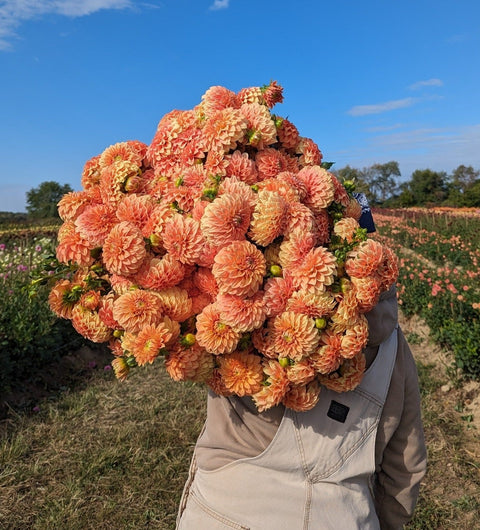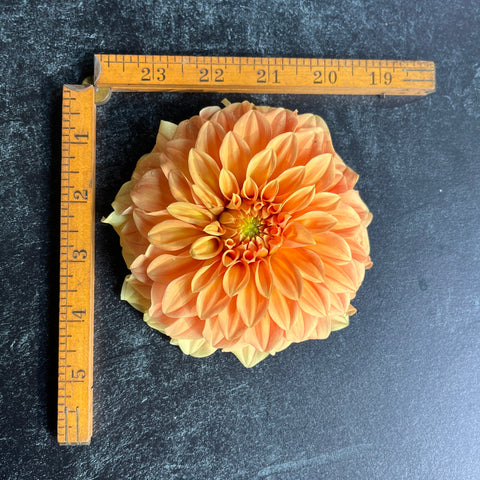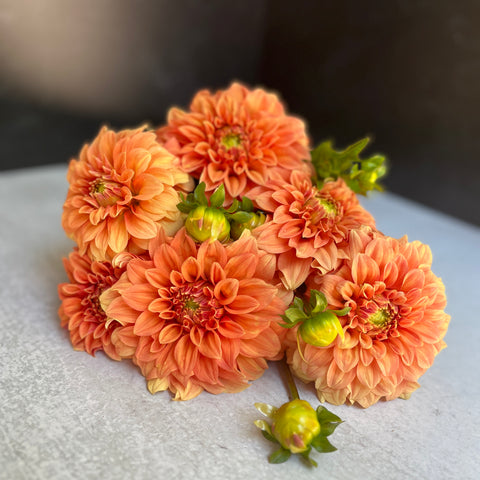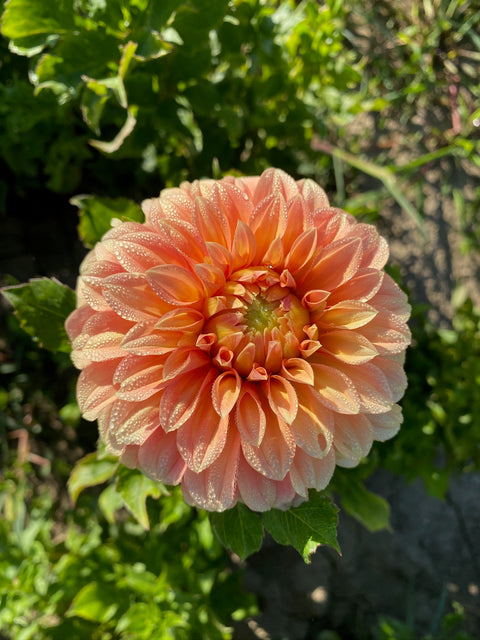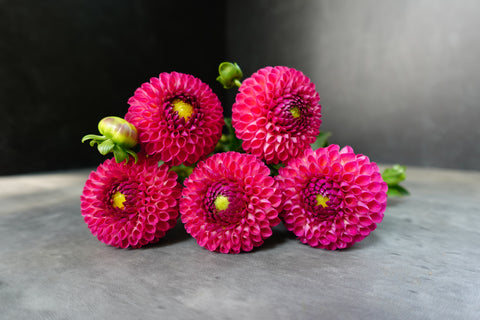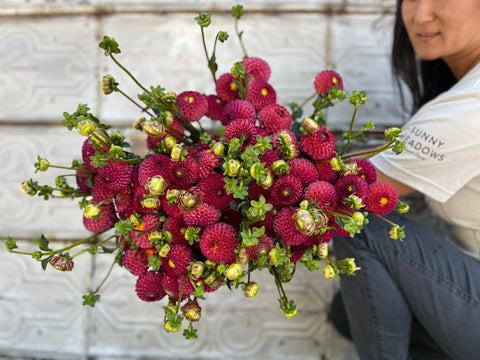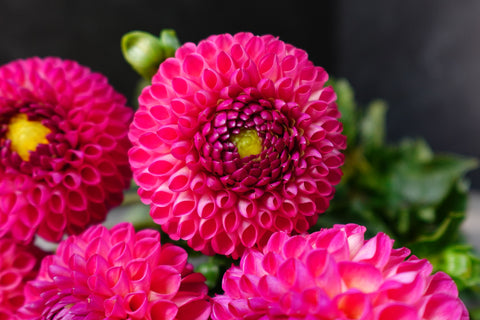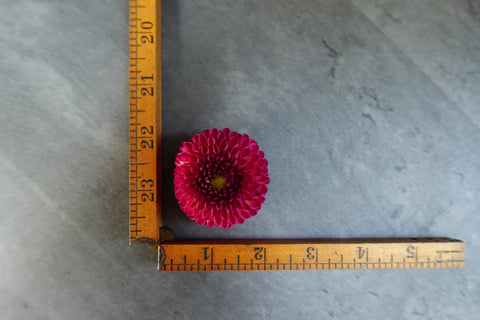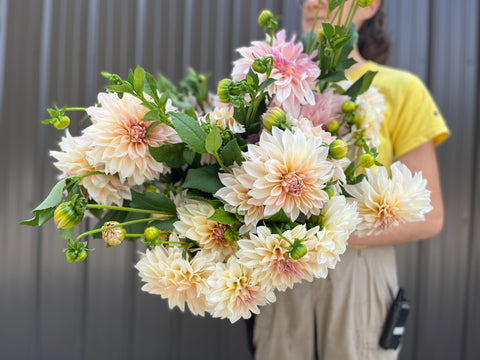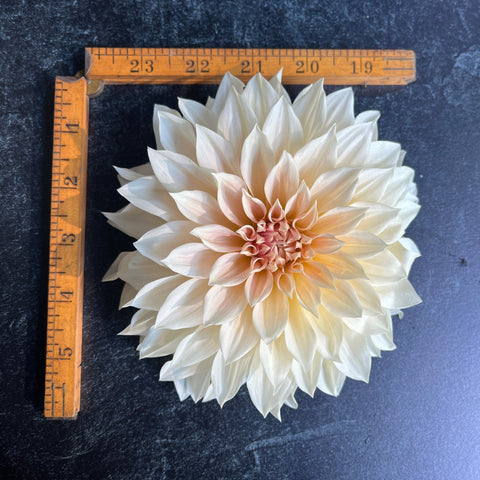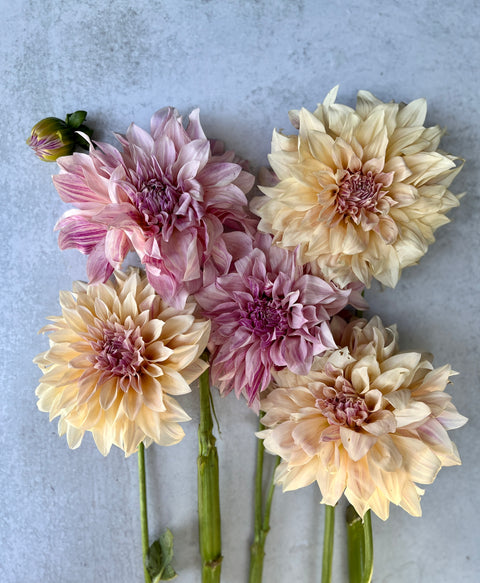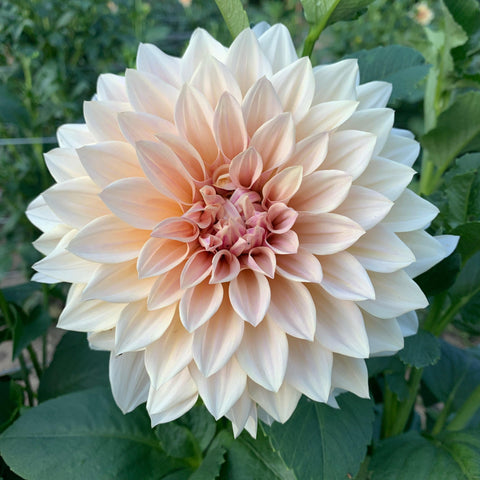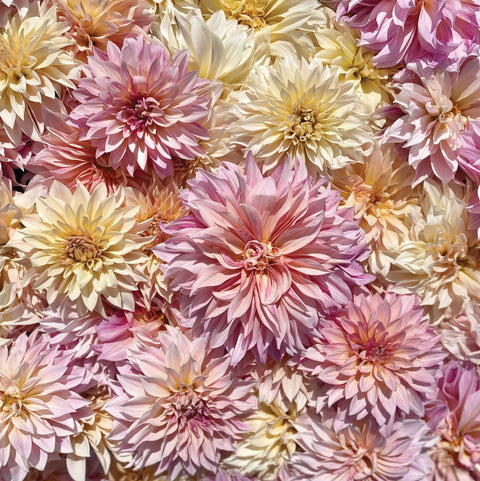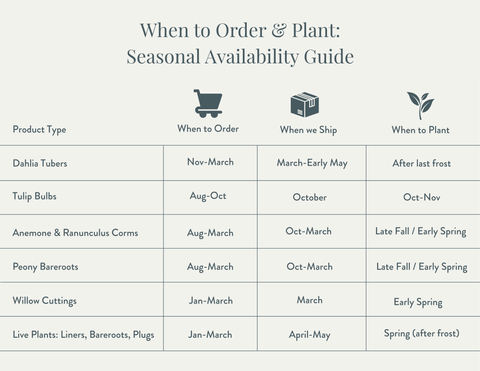Sunny Meadows Dahlia Tubers
Everything you need to know about buying, growing, and storing dahlias—straight from our flower fields to your garden.
Our dahlia tubers will go on sale starting Friday, November 14th at 9:00am EST.
ABOUT OUR DAHLIAS
We cultivate two dahlia crops each season: fresh cut blooms for florists and high-quality tubers that flower lovers can grow in their own gardens. Each season, we nurture thousands of plants in Columbus, Ohio, harvesting armloads of flowers for bouquets while also preparing premium tubers for our annual dahlia tuber sale.
Our team plants, tends, digs, divides, and stores every dahlia tuber on-site, keeping them at a steady 38ºF through the winter. Each spring, tubers are inspected, packed by hand, and shipped with care — often in small clumps to protect them in transit and give you more planting potential. We guarantee all of our tubers are true to name and have a live eye. Whether you want to enjoy fresh-cut dahlia blooms or fill your garden with tubers next season, we’d love to share the beauty and joy of this amazing flower with you.
ORDERING & SHIPPING
With high demand and a short shipping season, here area few important things to know before you fill your cart:
- Popular varieties sell quickly. Items in your cart are not reserved until checkout is complete and you receive an order confirmation email (check your spam folder). If something disappears from your cart, another customer purhased it first.
- No preorders or order changes. All tuber sales go through our online shop to ensure accurate inventory tracking. Once your order is confirmed, we cannot add, remove, or combine items. If you'd like more tubers, please place a separate order (shipping charges apply to each).
- Shipping & Delivery Options: Domestic U.S. shipping only
Early Shipping (Feb-March) - ideal for southern growers or propagation enthusiasts; $20 fee covers heat packs, insulation, and expedited shipping.
Regular Shipping (March-April) - best for April or later planting. Orders are shipped in the order received and timed to avoid freezing conditions.
Pickup & Delivery - Farm pickup is available by request (email sales@sunnymeadowsflowerfarm.com). Free local delivery in the Columbus area for orders over $75. - Receiving your order: Tubers are shipped in a dormant state, sorted by variety in bags, and packed inside boxes or padded envelopes along with a care sheet. Storage medium is not included. Be sure to unpack your order upon arrival, inspect your tubers and confirm your order is correct. If you're not planting right away, store your tubers in a cool, dry place (38º-45ºF, 75%-85% humidity). Avoid humid or wet areas, minimize airflow, and check periodically to prevent drying out or rotting.
DIVIDING & STORING DAHLIAS
End-of-Season Care
- Saving Dahlia Tubers. After the first hard frost, cut foliage to 4–6” (to use the stalk as a handle for the clumps). Leave the tubers in the ground for a week for the sprouts/eyes to develop on the tubers. Tubers dug too early are still “green” and will not store, while leaving them in the ground will allow for their skin to harden as it cures, like a potato. If you haven’t experienced a frost by mid-November it’s safe to dig the tubers at that time. Gently dig the tubers about 8” to 10” from the stem, shake off the excess soil carefully and wash off any soil. Allow them to air dry in an area protected from rain and frost for a few days. This air drying toughens the skin of the tuber for winter storage. Be sure to clean up the old foliage from the garden.
- Storing Tubers. Store tubers in a packing material such as slightly dampened peat moss or vermiculite in a paper bag in the basement. Use enough peat moss or vermiculite so the tubers aren’t touching each other. Store in a cool, dry, dark area (temperatures 40-50°F). If you have a lot of tubers to store, we like to use the lawn bags you can buy at the hardware store. Never store the tubers in plastic bags or plastic containers as they require some air flow to avoid rot. Check your tubers once a month throughout the winter months. If you see evidence of rot, they are too wet. If they are shriveled, they are too dry. If you find a rotten tuber remove it immediately so it doesn’t contaminate other tubers. If the tubers are shriveled, mist the peat moss or vermiculite lightly with water. If you have more than one variety, we suggest labeling each tuber. You can write directly on the tuber with permanent marker or use flagging tape if you have a whole bag of one variety.
- Dividing Dahlia Tubers. Dividing your dahlia tubers can be done in the fall or spring. Using a sharp knife, separate healthy tubers from the parent clump. Each tuber must have at least one “eye” or a piece of the crown attached or it will not develop into a blooming plant. You’ll find the eyes at the base of the stem and look like little pink bumps, note that not all individual tubers will have an eye. As long as you have a piece of the stem you’ll most likely have an eye that develops. If the neck of the tuber is broken, you will not have a viable tuber. Think about it like the body of the tuber isn’t connected to the head if the neck is broken, so will not have the brain to tell it to grow. Allow any cut tubers to dry for 24 hours before storing or planting. If you divide in the spring, move the tubers to a warm area for a week to allow the eyes to sprout so they’ll be easier to see.
- Dig deeper into dahlias. If you’d like to dive deeper into growing dahlias, we encourage you to connect with your local American Dahlia Society chapter or a nearby gardening or horticulture club—they’re wonderful resources for region-specific advice. Here on our Central Ohio farm, we make decisions based on regular lab analysis of our soil, water, and plant material, which means our methods are tailored to our location and commercial scale. Because every garden is unique, what works for us may not be the best fit for you, so local experts will be the best guides for your specific growing conditions.
FAQ & SUPPORT
Get answers related to dahlia tuber health, shipping & moreYes—all of our tubers are grown, harvested, and prepared right here at Sunny Meadows Flower Farm in Columbus, Ohio. Our team plants, tends, digs, divides, and stores each one on site, ensuring quality at every step.
We are not a certified organic farm, but we employ sustainable and natural practices whenever we can.
If needed, we dip tubers in OMRI-listed Oxidate after dividing to help prevent mold.
Yes—we regularly test our tuber and plant material with the Plant Pathology Program at The Ohio State University and Oregon State University.
Tubers are priced and sold individually, but may be shipped in small clumps with extra tubers attached. This helps protect them in transit and gives you extra planting potential.
Clumps reduce the risk of shipping damage—if one tuber breaks, another may still be viable. With the large volume of tubers we handle, shipping small clumps helps our crew work more efficiently during the dormant season, when eyes may be hard to see.
In the spring, each order is hand-packed and every tuber is inspected before mailing. Tubers ship dormant, and eyes may not be visible upon arrival.
If a variety fails to produce good tubers or doesn't store well, we will substitute with a variety of equal or greater value, with similar characteristics when possible.
Sorry, but once confirmed, orders cannot be changed, combined, delayed, or held.
We do not sell dahlia tubers wholesale, however, if you are a wholesale customer of ours looking for tubers, send us an email to let us know. We may be able to offer bulk pricing or a discount code depending on how our inventory looks in the spring.
Dahlias vary in shape and size, and dormant eyes may not be visible right away. They'll sprout at different rates depending on the variety.
No—due to phystosanitary restrictions, we can ship within the U.S. only.
The letters refer to official American Dahlia Society classifications. Learn more about dahlia forms and sizes here. If a variety is new or not yet vetted by ADS, it may not be listed.
Some tubers, especially heirloom or large-flowered varieties, naturally take longer to sprout—sometimes many weeks! Cool nights, inconsistent soil moisture (too wet or too dry), or pests like insects or voles can delay or prevent growth. Occasionally, a tuber may lack enough stored energy to sprout, or its eyes may be non-viable even if they look healthy. The best approach is to plant it in well-drained soil and give it time—patience is often all that’s needed for it to wake up and grow.
Once a sprout emerges, it depends on steady soil moisture and nutrients rather than the tuber’s reserves. Growth can pause if the soil dries out, fertility is low, the roots are waterlogged, or pests like slugs, cutworms, or earwigs nibble on new growth. Sudden temperature spikes before roots are established can also stress the plant. In most cases, a temporary stall isn’t a problem—given consistent care, the dahlia typically will resume growth.
Shop Dahlia Tubers
Sales starts Friday, November 14th @ 9:00am ESTWant to know more about the letters in our dahlia tuber descriptions?
The letters correspond to the official classification system set by the American Dahlia Association.

